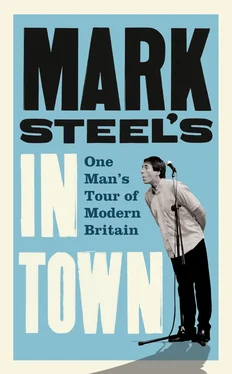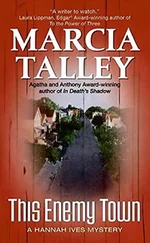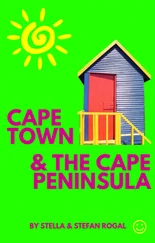Opposite the pier is a factory that anywhere else would have been converted into offices or flats or a restaurant, but that turns out still to be a factory. It makes Uncle Joe’s Mint Balls, the pride of Wigan. According to the logo, the mint balls will ‘Keep you all aglow’, and there’s a picture of Uncle Joe looking like your favourite uncle in a top hat, and you think you remember skipping down the street in short trousers with the sixpence you got for polishing Mr Higginbottom’s Austin Rover to buy a pack of mint balls, which were not only the finest sweets but back then were believed to prevent whooping cough.
The mint balls are defiantly Wigan, and I imagine the old couple from the market would be astonished if they met someone who’d never heard of them, as if they’d said they’d never heard of a banana.
No doubt the place is just as proud of its mint balls as it was of the Wigan man declared to be the fattest person in Britain. Eventually he couldn’t get out of his specially made seat, and relied on his wife, who, once it was confirmed he held the record, boasted about it to all her neighbours – ‘He’s the fattest in Britain now, you know’ – and showed them all the newspaper clippings that confirmed this triumph. It turned out she’d only met him after reading about his size in the local paper, and decided to make him her own. When he died the windows had to be removed so he could be hoisted through them, as there was no way he was getting through the door. A neighbour I spoke to, who’d never met him, was asked by his wife to go the funeral. When she said she was sorry, but she really couldn’t make it, the wife said with astonishment, ‘But he was the fattest man in Britain.’
Even the irresistible force of the Premier League has stumbled in its attempt to overwhelm Wigan as it does most places. Despite the local side having been in the top division for the past six seasons, the crowds are smaller than for the rugby league team.
So it shouldn’t be a surprise that the historical local hero, commemorated with a statue in the centre of town and his picture on all the official leaflets for local events, is George Formby. If Wigan’s most famous figure was a prominent physicist or an influential Pre-Raphaelite painter it would be a terrible let-down, like finding out that your great-grandfather was a pimp.
George Formby was a buck-toothed banjolele player who sang slightly saucy songs with lyrics such as ‘If you could see what I can see, when I’m cleaning windows’. It’s unlikely that any of his songs will ever be covered by 50 Cent, but he was a super-star who people from a place like Wigan could identify with, who they could imagine bumping into at the pub. This image went beyond Wigan, as he became hugely popular in Soviet Russia, and it was even rumoured that Stalin had awarded him the Order of Lenin. This would presumably have irritated the odd Soviet commander, who might have lived through the siege of Leningrad for two years living off earthworms and fighting the Nazis using whittled toenail clippings as weapons, only to lag in the queue for a medal behind a banjolele player from Wigan. The story of the medal was an exaggeration, but there was something about Formby that was the embodiment of Wigan, not just working-class but unashamedly so. Otherwise how could he have sung a song called ‘The Wigan Express’ that went ‘She got some shocks in her signal box’?
In 1946, when he toured pre-apartheid South Africa, he upset his hosts by refusing to play segregated venues. As a result a black member of one audience presented Formby’s wife Beryl with a box of chocolates, and George gave the man a hug. National Party leader Daniel François Malan, who would introduce apartheid two years later, heard about this and phoned Beryl to complain, to which she replied, ‘Why don’t you piss off, you horrible little man?’
At first the idea of George Formby and his wife as radical anti-apartheid activists seems as surreal as finding out that Bobby Davro spent five years as a guerrilla fighting with Che Guevara, but in a way it symbolises Wigan’s history as an apparently jolly working-class town getting by without complaining, but with a calm commitment to rebellion underneath. In 1779 cotton workers in Wigan staged one of Britain’s first riots against unemployment. It lasted for several days, until the militia was brought in from Liverpool. The area was at the centre of the Lancashire Luddite riots, and in 1842 a strike of spinners ended up in a battle with two companies of riflemen.
The first miners’ strike of the twentieth century was in Wigan, in 1921 Wigan miners rioted until dispersed by the 16th Hussars, and the local pits were influential in every national strike. It feels as if a Wigan historian might say, ‘Ee, I’ll not call it proper decade if we’ve not been fired on by yeomen or suchlike.’
All this may make Wigan an unlikely setting for a vegan pagan café run by warlocks and called the Coven, but it was right opposite the main station. The warlocks greeted you with the most unsettling behaviour warlocks could manage, by being disconcertingly normal. ‘Hello love, right windy today, isn’t it? How about a piping-hot mug of elderflower-and-nettle tea to warm them bones up?’ one of them said.
The place was cluttered with sticks of incense, dream catchers and models of black cats, and there was a cheery sign informing you they’d cast a spell for you if you liked, in that chirpy lettering that looks as if it’s been written by a neat ten-year-old to be put on the classroom wall. But somehow warlocks seem palatable when they’re working-class and from Wigan. They were warm and neighbourly warlocks, always likely to nip in to see old Elsie on the way home, as she’s getting on and can be a bit forgetful, and one night when she’d forgotten to get any food for her cat, the friendly warlock turned it into stone until the morning so it wouldn’t get hungry.
Sometimes they were disappointingly normal, just bringing you a coffee when you were hoping they’d break into a naked fertility dance. But one Saturday afternoon in the Coven, with my daughter and her friend, we were waiting for our drinks by the upstairs window while flicking through a folder of common hexes. Suddenly the girls said, ‘Wow, look at that!’ A group of men had rushed out onto the street from the Wetherspoon’s pub next door. One of them was on crutches, and he made four agile bounds before deftly swinging them onto the back of someone he must have had a disagreement with on some issue. The street quickly became a battlefield. ‘Someone should do something,’ said the owner of the café. Presumably he’d run out of the potion that deals with a mass crutch-wielding brawl, or at least shrinks the fighters to the size of mice, so they don’t hold up the traffic.
It was almost as if the fighters were making a statement, that you can sit somewhere fancy and pagan if you like, but you can’t escape the real Wigan.
The place where the real Wigan meets the world of chain-company uniformity head on, where the greatest imagination has been displayed in the quest to eliminate imagination, is King Street, which is made up entirely of nightclubs. This isn’t a seedy quarter with bands playing under railway arches, and shirtless DJs scratching from what was once an office in a converted tinned-pudding warehouse. There are twelve clubs in a row, including Walkabout, Revolution, and a fake Irish place. The road is blocked to traffic, and outside each entrance a pair of bald men in black suits act as sentries, so you feel a sense of relief and smug achievement if you get in at all. At the first one we were told sternly by the bald men that it was open until 6 a.m. This information was conveyed with the sort of chilling menace with which I expect guards at Abu Ghraib said ‘You’ll be in here until 6 a.m.’ to prisoners as they were being shown into a room full of rusty implements.
Читать дальше












